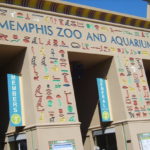This project calls for the development of an application for the Memphis Zoo in which material and student collaboration is applied through Rhodes courses in order to develop a more complete picture of animal evolution.
Dr. Boyle oversees a partnership between Rhodes College and the Memphis Zoo that provides students with unique opportunities to gain research experience in the fields of animal behavior, stress and reproductive physiology, and conservation. The partnership engages students with the zoo’s staff scientists and animal keepers, provides students with hands-on research experiences, and assists the zoo with collecting and analyzing valuable data that are used to better understand captive animals. This year-long partnership that she oversees involves 30-35 students every year through Biology Research (BIOL 451/452/453), summer fellowships, and the Animal Behavior (BIOL 207/207L) course. As a Mellon Faculty Fellow, Dr. Boyle enhanced the Rhodes-Memphis Zoo partnership by having these students communicate their scientific findings to the zoo visitors through an online website, thereby providing the general public with an understanding about the importance of the research that is conducted at the zoo. This site integrated material from Dr. Jabaily’s Evolution course with the findings from her Animal Behavior course and year-round research projects, as described below.
Every fall Animal Behavior students meet with zoo scientists, design semester-long behavioral research projects, and present their findings in a scientific paper and in a poster session that is held at the zoo. The projects integrate classroom knowledge with a hands-on research experience that benefits a community partner. Although the Animal Behavior poster session is open to the public, the audience primarily consists of scientists. Similarly, the year-long research students communicate their findings to the scientific community at the Tennessee Academy of Sciences every spring. Although it is critical that Rhodes students share their findings with the scientific community, a major component of science is communicating one’s work to the general public. Therefore, Dr. Boyle engaged the Animal Behavior and year-long research students in designing content for a site for zoo visitors. Such content has included text, photos, simplified research figures, and videos that explain the research findings and explanations on how the research is conducted. Students took their research findings and put them in format that is appealing and informative to zoo visitors of all ages. This content integrate well with the content that Dr. Jabaily’s Evolution students put together. For example, visitors could visit the hippos and the site would provide information about hippo natural history (from the students in the Evolution course) and then Dr. Boyle’s students would provide an overview of the two female hippos, what their specific behaviors mean (with video examples of such behaviors), and a description of the multiyear research project that is underway. The content from Dr. Jabaily’s students combined well with the content from Dr. Boyle’s students, and together the site is much more informative by providing background information about the species’ natural history as well as real-world examples of research that is currently being conducted at the zoo.
This project enhanced Dr. Boyle’s teaching pursuits by expanding the Animal Behavior course content and the year-long research mentorship that she does: students contributed to the zoological research field and shared their findings with a broad audience. Translating the research that was conducted through the Rhodes-Zoo partnership to the general public provided the public with a more informative zoo experience, provided Rhodes students with skills in communicating science to a broader audience, expanded Dr. Boyle’s teaching and research mentoring to include more direct forms of outreach to the community, and helped the zoo with community education and outreach. Furthermore, the Mellon fellowship provided Dr. Boyle with a means by which to gain new ideas and discuss strategies with her peers as how to integrate community engagement in her courses. Dr. Boyle believes she contributed to this cohort by bringing her experiences working with the zoo.
Student fellows were valuable in helping to design and maintain the app. They also communicated with the zoo scientists, the Rhodes students involved in research projects, and Dr. Boyle to help create and provide additional content for the site. The fellows also helped integrate the research content from the current proposal with the evolution content for Dr. Jabaily’s proposal.
The outcomes of the project included the creation of content for an online website that allows zoo visitors to gain a better understanding of animal behavior and of the type of research that is conducted at zoos. Furthermore, Rhodes students learned to communicate their scientific findings to a broad audience, and in doing so they directly contributed to the Memphis Zoo’s mission in providing an educational experience for the public.

Sarah Boyle
Chair of Environmental Studies and Sciences
Assistant Professor of Biology
Dr. Boyle studies how human actions impact the distribution, ecology, and conservation of fauna and flora, and her research addresses the extent to which a species modifies its behavior when living in areas of high disturbance.


